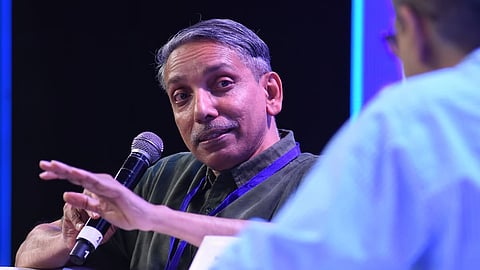"ONOS specifically designed to address inequities in access to scholarly resources": UGC Chief
As the One Nation One Subscription (ONOS) policy takes center stage in India's academic discourse, UGC Chairman Mamidala Jagadesh Kumar emerges as one of its most vocal advocates. In an exclusive conversation with EdexLive, Kumar outlines how the initiative aims to democratize access to high-quality research, reduce financial burdens on institutions, and empower scholars across the country. With ONOS set to impact over 1.8 crore students, faculty, and researchers, Kumar envisions a future where equitable access to knowledge transforms India’s academic and research landscape. Here, he addresses key questions, dispels concerns, and shares his vision for this landmark policy.
How does ONOS reduce the financial burden on universities for journal subscriptions?
ONOS will have the collective bargaining power of the Indian government to negotiate significantly lower subscription costs with publishers. This will certainly reduce the financial burden on individual universities, especially smaller or underfunded ones.
This initiative is a significant step towards democratising knowledge and promoting academic excellence in every corner of India. We believe ONOS will empower researchers and learners at all institutions, helping innovation and progress across disciplines.
Will this policy help create a more equal academic environment across institutions in India?
One Nation One Subscription (ONOS) is specifically designed to address the inequities in access to scholarly resources. By centralising journal subscriptions and negotiating favorable terms, we aim to make high-quality research materials accessible to all Indian universities, regardless of their size or funding.
When it comes to smaller or underfunded institutions and giving them access to journals they couldn’t afford before, ONOS sounds like good news. Tell us more about the same.
Smaller and underfunded institutions often struggle to afford the expensive subscription fees of individual journals. ONOS will eliminate this financial barrier, providing them with access to a vast repository of knowledge that previously may have been beyond their reach. This levels the playing field, will enable students and faculty at these institutions to engage with cutting-edge research, will contribute to advancements in their fields, and ultimately enhance the quality of education and research across the country.
Critics have suggested that centralizing subscriptions might lead to biases in the selection process of journals, and that ONOS might reduce universities' freedom to choose their own journals. How would you allay such fears?
The packages offered to the universities will be comprehensive. UGC understands the importance of institutional autonomy. Universities will continue to have the freedom to subscribe to additional journals using their institutional internal resources beyond the ONOS packages to cater to specific needs.
For example, a specialised bioscience university will likely have access to a broad selection of journals, including those beyond its core discipline, through ONOS. If they require a highly specialised journal not included in the package, they are free to subscribe to it independently using their internal resources.
The primary goal of ONOS is to maximise access to high-quality research for all Indian universities, ensuring a level playing field and enhance the research ecosystem while respecting the individual needs and preferences of each institution.
A total of 30 major international journal publishers have been included in ONOS. What was the process by which they were determined to be the best choices?
The journals were selected based on their global reputation and the quality of journals they publish. The journals represent a wide range of disciplines, ensuring that the needs of students, researchers, and faculty from STEM (Science, Technology, Engineering, and Mathematics) and non-STEM fields are met. The publishers were chosen through rigorous negotiations to provide access to the maximum number of high-quality journals at the most cost-effective rates offering comprehensive collections that align with the educational and research needs of Indian institutions.
Do you think this initiative could improve India’s global standing in academic research?
We believe ONOS holds immense potential to elevate India's global standing in academic research. We are empowering our researchers with the knowledge and tools they need to produce impactful work that contributes to the global knowledge pool.
While the full impact of ONOS will unfold over time, it lays the foundation for Indian researchers to participate more actively in international dialogues, publish in top-tier journals, and ultimately contribute to solving global challenges. It is important to remember that building a strong research presence on the global stage is a long-term endeavor. ONOS is a crucial step in this journey, and its effects will become increasingly evident as our researchers leverage its benefits to produce high-quality, impactful work that resonates globally.


